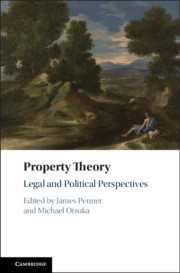Book contents
- Property Theory
- Property Theory
- Copyright page
- Contents
- Contributors
- Preface
- 1 The Public Nature of Private Property
- 2 Legal Forms in Property Law Theory
- 3 What Is the Right to Exclude and Why Does It Matter?
- 4 Using Things, Defining Property
- 5 Is Original Acquisition Problematic?
- 6 Appropriating Lockean Appropriation on Behalf of Equality
- 7 Rights, Distributed and Undistributed: On the Distributive Justice Implications of Lockean Property Rights, Especially in Land
- 8 Lockean Property Theory in Confucian Thought: Property in the Thought of Wang Fuzhi (1619–1692) and Huang Zongxi (1610–1695)
- 9 Two Ways of Theorizing ‘Collective Ownership of the Earth’
- References
- Index
8 - Lockean Property Theory in Confucian Thought: Property in the Thought of Wang Fuzhi (1619–1692) and Huang Zongxi (1610–1695)
Published online by Cambridge University Press: 10 August 2018
- Property Theory
- Property Theory
- Copyright page
- Contents
- Contributors
- Preface
- 1 The Public Nature of Private Property
- 2 Legal Forms in Property Law Theory
- 3 What Is the Right to Exclude and Why Does It Matter?
- 4 Using Things, Defining Property
- 5 Is Original Acquisition Problematic?
- 6 Appropriating Lockean Appropriation on Behalf of Equality
- 7 Rights, Distributed and Undistributed: On the Distributive Justice Implications of Lockean Property Rights, Especially in Land
- 8 Lockean Property Theory in Confucian Thought: Property in the Thought of Wang Fuzhi (1619–1692) and Huang Zongxi (1610–1695)
- 9 Two Ways of Theorizing ‘Collective Ownership of the Earth’
- References
- Index
Summary
- Type
- Chapter
- Information
- Property TheoryLegal and Political Perspectives, pp. 161 - 186Publisher: Cambridge University PressPrint publication year: 2018
- 1
- Cited by



